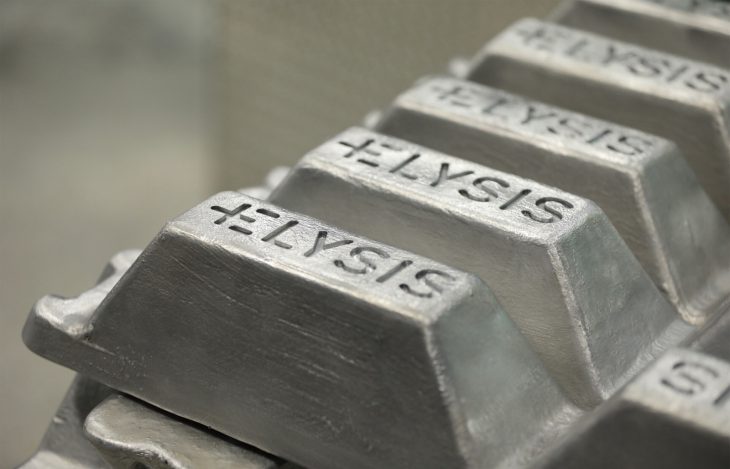Alcoa Corporation and Rio Tinto introduced a revolutionary process that could dramatically improve the carbon footprint of the primary aluminum process. The patent-protected technology, developed by Alcoa, is designed to eliminate all direct greenhouse gas emissions from the traditional aluminum smelting process.
“This discovery has been a long-sought goal for the aluminum industry, and this announcement is the culmination of the work from many dedicated Alcoa employees,” said Roy Harvey, president and CEO of Alcoa. “Our history of innovation continues as we take aluminum’s sustainable advantage to a new level with the potential to improve the carbon footprint of a range of products from cars to consumer electronics.”
The technology essentially replaces carbon-based anodes (which produce CO2 and other harmful emissions) with proprietary materials that produce only oxygen as a byproduct. The patent-protected technology, developed by Alcoa, is currently producing metal at the Alcoa Technical Center, near Pittsburgh in the U.S., where the process has been operating at different scales since 2009. If fully implemented at existing aluminum smelters in Canada, the technology could eliminate the equivalent of 6.5 million metric tonnes of greenhouse gas emissions. That represents an amount roughly equal to taking nearly 1.8 million light-duty vehicles off the road.
“This is a revolutionary smelting process that can deliver a significant reduction in carbon emissions,” said J-S Jacques, Rio Tinto chief executive. “It builds on the key role aluminum has to play in driving human progress, by making products infinitely recyclable, stronger, lighter and more fuel efficient.”
To advance larger scale development and commercialization of the new process, Alcoa and Rio Tinto are forming Elysis, a joint venture company to further develop and license the technology so it can be used to retrofit existing smelters or build new facilities. Elysis will be headquartered in Montreal with a research facility in Quebec’s Saguenay–Lac-Saint-Jean region and will directly employ 100 people, including research and development, management, and sales. Vincent Christ, an experienced leader with more than 30 years’ experience at Rio Tinto Aluminium, has been named chief executive officer of Elysis. The company name refers to the process at the center of aluminum smelting, the electrolysis of alumina.
Alcoa, Rio Tinto, the Government of Canada, the Government of Quebec, and Apple have agreed to provide a combined investment of C$188 million to support the development of the process. Canada and Quebec are each investing C$60 million in Elysis, with the provincial government of Quebec having a 3.5% equity stake in the joint venture with the remaining ownership split evenly between Alcoa and Rio Tinto.
“With the establishment of this new facility, Québec will continue to lead the world in the development of advanced aluminum smelting technologies,” said Philippe Couillard, premier of Québec. “Our investment will play a key role in the large scale development of this carbon-free aluminum smelting technology, so it can be deployed and deliver significant environmental benefits with well paid, highly skilled jobs here in Québec.”
Apple is providing an investment of $13 million (CAD). The company helped facilitate the collaboration between Alcoa and Rio Tinto on the carbon-free smelting process, and Apple has agreed to provide technical support to the JV partners. “Apple is committed to advancing technologies that are good for the planet and help protect it for generations to come,” said Tim Cook, CEO of Apple. “We are proud to be part of this ambitious new project, and look forward to one day being able to use aluminum produced without direct greenhouse gas emissions in the manufacturing of our products.”
Rio Tinto and Alcoa will invest $55 million (CAD) cash over the next three years and contribute specific intellectual property and patents.
When fully developed and implemented, this new technology will eliminate direct greenhouse gas emissions from the smelting process and strengthen the closely integrated Canada-United States aluminium and manufacturing industry. The new joint venture company will also sell proprietary anode and cathode materials, which will last more than 30 times longer than traditional components.
Elysis intends to invest up to C$40 million in the U.S., which would include funding to support the supply chain for the proprietary anode and cathode materials.
A technology package is expected to be available for sale beginning in 2024.

